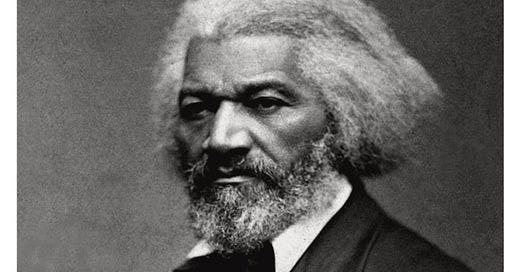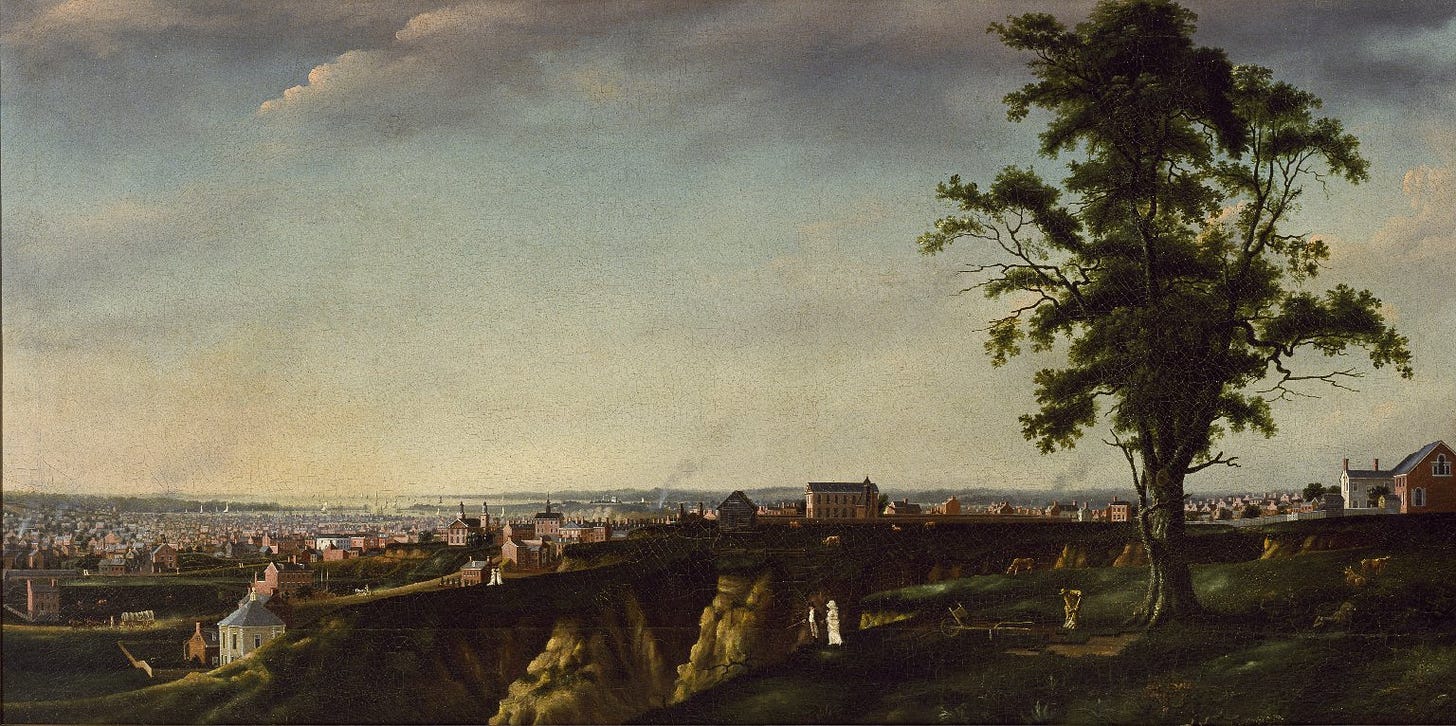Frederick Douglass Biography on Kindle
Hi everyone,
The Kindle version of our Frederick Douglass Biography is now available for purchase on Amazon. The book is available in full below for paid subscribers.
Thank you for your patience and understanding as we learn how to best publish our snapshot books!
Introduction
Frederick Douglass was born into enslavement in Maryland with barely an identity. He died as one of the greatest and best-known Americans, having escaped slavery and dedicated much of his adult life to advocating equal rights for all.
Chapter 1: Early Life and Enslavement Beginnings
"I have found that, to make a contented slave, it is necessary to make a thoughtless one. It is necessary to darken his moral and mental vision, and, as far as possible, to annihilate the power of reason…He must be made to feel that slavery is right; and he can be brought to that only when he ceases to be a man." - Frederick Douglass1
Frederick was born into enslavement with the ironically regal name of Frederick Augustus Washington Bailey. Like most enslaved people, he didn't know his birthday. He just knew that his birth happened sometime around 1817 in Talbot County, Maryland. He also didn't know who his father was. Though based on rumors, it was the plantation master. And as for his mother, she didn't live with Frederick. She was moved during his infancy and enslaved on a plantation about a dozen miles away. "My poor mother, like many other slave women, had many children, but NO FAMILY!,"2 he would later write. Frederick's memories of her were sparse. Just a handful of times they met, when she'd walk at night to be with her son for a few hours before heading back. She had to be at work in the morning. Those visits ended when she passed away around the time Frederick was seven years old. Such went the beginning of the young boy's life. Father unknown, mother miles away at first, and then orphaned.
In those early years of youth, Frederick was raised by his maternal grandparents, Isaac and Betsey Bailey, who lived in a rough-hewn cabin on the outskirts of the plantation, separated from the main quarters. Here, Betsey provided most of the care to Frederick, creating an environment of relative stability and warmth for the young boy. While Frederick doesn't delve much into how he spent those early years, he does later write, "Grandmammy was, indeed at that time, all the world to me."3
At about six years old, the typical age for enslaved children to begin working, Frederick was sent to the plantation, where he began to bear witness to the cruelties of slavery. He saw the hard labor and strict overseers and observed frequent whippings and punishments, including that of his aunt, which left an indelible mark on him. He later recalled,
"I remember the first time I ever witnessed this horrible exhibition. I was quite a child, but I well remember it. I never shall forget it whilst I remember any thing. It was the first of a long series of such outrages, of which I was doomed to be a witness and a participant. It struck me with awful force. It was the blood-stained gate, the entrance to the hell of slavery, through which I was about to pass. It was a most terrible spectacle. I wish I could commit to paper the feelings with which I beheld it."4
While Frederick wouldn't experience whippings at this time in life, he experienced other forms of harsh cruelty. "I suffered much from hunger, but much more from cold. In hottest summer and coldest winter, I was kept almost naked—no shoes, no stockings, no jacket, no trousers, nothing on but a coarse tow linen shirt, reaching only to my knees. I had no bed. I must have perished with cold, but that, the coldest nights, I used to steal a bag which was used for carrying corn to the mill. I would crawl into this bag, and there sleep on the cold, damp, clay floor, with my head in and feet out. My feet have been so cracked with the frost, that the pen with which I am writing might be laid in the gashes,"5 he wrote.
Around age eight marked a significant change in Frederick's life; he was sent to work in Baltimore for relatives of the plantation master. The city of about seventy thousand people at the time was home to a bustling port and a diverse population. It also had less rigid structures of slavery, offering enslaved individuals like Frederick a degree of autonomy and exposure that was unattainable on a plantation.
In his new home, the young boy saw a glimpse into a different world when the mistress of the house, who Frederick described as "a woman of the kindest heart and finest feelings,"6 began teaching him the alphabet and how to read. The learnings opened his mind to new ideas, which he found enthralling. But this didn't last long, however. Upon learning of the lessons, her husband forbade them to continue, stating that literacy would "spoil"7 an enslaved person, making them unsuitable for servitude and planting ideas of freedom.
For Frederick, however, a new perspective had already opened. He now saw literacy as a path to freedom, which ignited a fierce determination within him to learn. He clandestinely began teaching himself to read and write using scraps of newspapers, books, and the Bible, and for help, he turned to the neighborhood poor white children for lessons, offering them food in exchange. Frederick would later reflect on this period, emphasizing the profound realization that knowledge could be his pathway out of bondage. The more he read, the more he became aware of the world beyond the confines of slavery, and the stronger his desire grew to break free from his chains.
It was also in this experience that Frederick had a profound realization about the ill effects of enslavement, not just on those enslaved but on the enslavers as well. Once the mistress could no longer teach Frederick, her demeanor changed. She became mean. The change in his mistress's behavior highlighted the corrupting power of slavery. As Frederick observed,
"My mistress was, as I have said, a kind and tender-hearted woman; and in the simplicity of her soul she commenced, when I first went to live with her, to treat me as she supposed one human being ought to treat another. In entering upon the duties of a slaveholder, she did not seem to perceive that I sustained to her the relation of a mere chattel, and that for her to treat me as a human being was not only wrong, but dangerously so. Slavery proved as injurious to her as it did to me. When I went there, she was a pious, warm, and tender-hearted woman. There was no sorrow or suffering for which she had not a tear. She had bread for the hungry, clothes for the naked, and comfort for every mourner that came within her reach. Slavery soon proved its ability to divest her of these heavenly qualities. Under its influence, the tender heart became stone, and the lamblike disposition gave way to one of tiger-like fierceness. The first step in her downward course was in her ceasing to instruct me. She now commenced to practise her husband's precepts. She finally became even more violent in her opposition than her husband himself. She was not satisfied with simply doing as well as he had commanded; she seemed anxious to do better."8
The chapter of life in Baltimore ended in March of 1832 when Frederick was sent back to a rural plantation. But from his time in Baltimore came two significant changes in his life. The first was a commitment to learning to read and write. The other was thoughts of life as a free man. "The thought of being a slave for life began to bear heavily upon my heart,"9 he wrote. While Frederick could find ways to learn, the desire for freedom would have to wait.
Chapter 2: Rural Enslavement
"I suffered more anxiety than most of my fellow-slaves. I had known what it was to be kindly treated; they had known nothing of the kind. They had seen little or nothing of the world. They were in very deed men and women of sorrow, and acquainted with grief. Their backs had been made familiar with the bloody lash, so that they had become callous; mine was yet tender."1 - Frederick Douglass
While enslavement was always unjust and cruel, life for those enslaved in the countryside tended to be worse than for those in cities. Frederick experienced this change upon moving to the plantation, where the work was grueling and the punishments frequent and severe. Whippings became a regular part of his life.
Keep reading with a 7-day free trial
Subscribe to Historical Snapshots to keep reading this post and get 7 days of free access to the full post archives.





